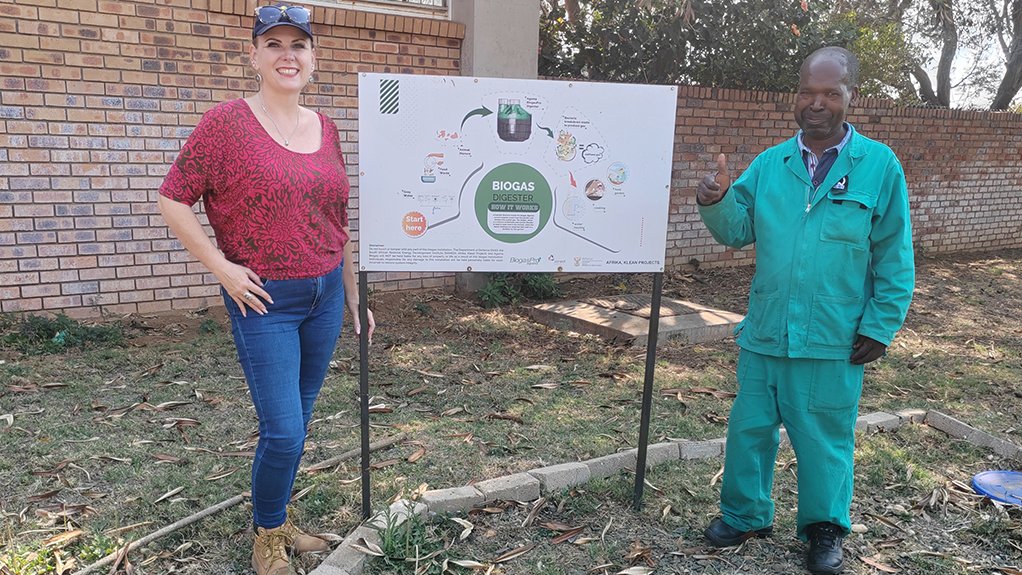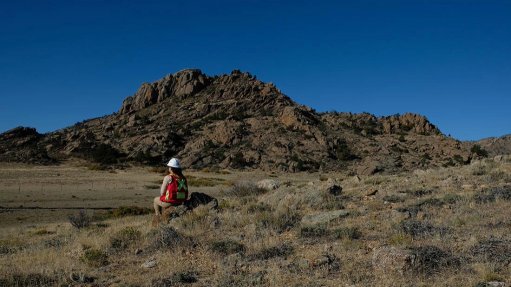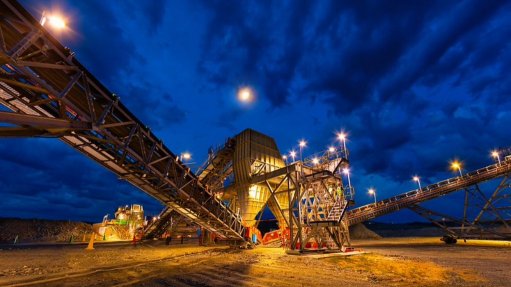Biodigester pilot project at Limpopo military bases a success
At South Africa’s most northern air force base, on the outskirts of Louis Trichardt in Limpopo, a biodigester has been successfully producing biogas for the past two years, as part of a pilot project with the South African National Energy Development Institute (SANEDI).
Precast biodigesters were installed at Air Force Base Makhado and the 523 Squadron (SQN) army base, which were selected as the pilot sites for the Department of Defence’s biodigester project to turn kitchen food waste destined for landfill into biogas for cooking.
The biogas plants consist of large, sealed anaerobic digesters in which waste material is decomposed to produce methane gas. These were installed underground at the bases to make them unobtrusive and to prevent any unpleasant sights or smells around them. In addition to gas for cooking, the digesters produce an organic by-product, called the digestate, which is an excellent organic fertiliser.
However, a critical success factor that often scuppers biogas projects is, says SANEDI’s Renewable Energy Centre of Research and Development centre manager Dr Karen Surridge.
“Biodigesters are the most labour-intensive renewable energy technology. I always say it’s like having a baby, and people don’t believe it until they have a biodigester to look after and keep alive.”
Biodigesting is an organic and biological process driven by the same bacteria that keep the human digestive system healthy. These live organisms are the reason that every biodigester is unique, with its own preferences and quirks. And that is why they require such care.
“I know that my biodigester likes more water on Wednesdays and the time it takes me to sing Happy Birthday twice gets enough water into the digester’s daily diet,” quips civilian military member Morris Rathumbu.
Surridge remembers introducing the project two years ago and Rathumbu immediately being interested.
“It is thanks to his dedication that the project is such a resounding success at the air force base,” she says.
Where it usually takes a biodigester six months to become fully operational, Rathumbu’s “baby” got there in only four months and in the two years since it has run without a single glitch.
“I’ve never seen anything like this. It is unheard of for a biodigester to be this ‘happy’,” Surridge says.
The upshot of the digester’s happiness is that it produces enough gas for the stove-top cooking required to provide breakfast and supper for 220 people every day, thus saving a predicted amount of about 116 MWh of electricity over the combined system’s lifetime. Based on this performance, it will be possible to add two more biodigesters in parallel on this system to power additional cooking burners and a water heater in the kitchen.
The pilot at the 523 SQN base has followed a more roundabout route to success. Although the base commander had also adopted his biodigester from the start, the duties of a high-ranking officer limited the attention he could pay to it. The biodigester has needed “resuscitation” twice since July 2021– both times the commanding officer had been away from base.
Surridge laughs at the memory of receiving a phone call on a Saturday morning: “Doctor, the baby is dead!” shouted the officer down the line. It seemed that cleaning fluids used to clean the sink in which the macerator is installed had ended up in the biodigester and instantly killed all the bacteria.
There was also the time when the system was fed too much undiluted starch, which clogged the pipes and the resultant gas build-up blew back into the kitchen through the sink. “It looked like the macerator had vomited,” says Surridge.
Although it has taken almost 21 months to reach full capacity, 523’s biodigester is humming these days, producing enough cooking gas to prepare daily meals for the people stationed at the base.
To date, 17.5 MWh of electricity has been saved, 6.5 t of carbon dioxide emissions eliminated and 30 t of kitchen waste diverted from landfill.
The two bases were carefully chosen to demonstrate that biodigester plants can be tailored to specific needs and provide a wide range of solutions, and that they can be scaled up or down by order of magnitude, depending on the energy requirements and raw materials available.
“Two years down the line, we can declare the pilot a success,” says Surridge.
Comments
Press Office
Announcements
What's On
Subscribe to improve your user experience...
Option 1 (equivalent of R125 a month):
Receive a weekly copy of Creamer Media's Engineering News & Mining Weekly magazine
(print copy for those in South Africa and e-magazine for those outside of South Africa)
Receive daily email newsletters
Access to full search results
Access archive of magazine back copies
Access to Projects in Progress
Access to ONE Research Report of your choice in PDF format
Option 2 (equivalent of R375 a month):
All benefits from Option 1
PLUS
Access to Creamer Media's Research Channel Africa for ALL Research Reports, in PDF format, on various industrial and mining sectors
including Electricity; Water; Energy Transition; Hydrogen; Roads, Rail and Ports; Coal; Gold; Platinum; Battery Metals; etc.
Already a subscriber?
Forgotten your password?
Receive weekly copy of Creamer Media's Engineering News & Mining Weekly magazine (print copy for those in South Africa and e-magazine for those outside of South Africa)
➕
Recieve daily email newsletters
➕
Access to full search results
➕
Access archive of magazine back copies
➕
Access to Projects in Progress
➕
Access to ONE Research Report of your choice in PDF format
RESEARCH CHANNEL AFRICA
R4500 (equivalent of R375 a month)
SUBSCRIBEAll benefits from Option 1
➕
Access to Creamer Media's Research Channel Africa for ALL Research Reports on various industrial and mining sectors, in PDF format, including on:
Electricity
➕
Water
➕
Energy Transition
➕
Hydrogen
➕
Roads, Rail and Ports
➕
Coal
➕
Gold
➕
Platinum
➕
Battery Metals
➕
etc.
Receive all benefits from Option 1 or Option 2 delivered to numerous people at your company
➕
Multiple User names and Passwords for simultaneous log-ins
➕
Intranet integration access to all in your organisation





















